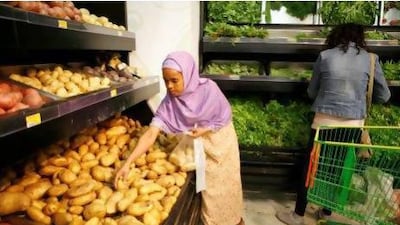With rising food prices and securing food supplies topping the political agenda in the Middle East, governments should look at direct financing of the agricultural supply chain in order to limit foreign dependency and bring greater stability.
This is not a new issue. Since the year 2000, the issues of food security and food-price inflation have established themselves firmly in the minds of policymakers worldwide. This is a period during which the world's population has grown by more than a billion and the World Bank Food Price Index has increased by 300 per cent.
This rise in food prices and lack of sufficient foodstuffs has proven to be one of the major catalysts for much of the civil unrest witnessed not only throughout North Africa but across the globe.
For import-dependent countries, securing access to long-term food supplies has never been of more critical importance.
Not long ago, targeted economic aid or direct investment would have been the avenues for importers to ensure access to overseas food production.
Today's reality of economic austerity and stagnant growth has forced governments to place the resolution of domestic issues above pursuing risky aid or investment related foreign policy agendas. In the Middle East particularly, the majority of countries are net-food-importers and governments provide subsidised food prices. This is increasing budget deficits and sharp food price rises are putting serious strain on domestic financial policy.
Within this context there emerges both an interesting opportunity and a solution: commodity trade finance.
A line of business historically dominated by banks, commodity trade finance remains a tool whose full potential remains largely underexplored by governments seeking a means of satisfying key foreign and domestic policy objectives.
Across the globe, almost every business or individual involved in producing, transporting or transforming agricultural goods shares the need for working capital loans in order to fund their business. This is commodity trade finance.
If it ceased to exist and the members of the supply chain were forced to rely exclusively on their own equity to finance the production, trade and processing of the food we consume, the world would plunge into famine tomorrow. In short, trade finance is the life-blood that supports every member in the global and perpetual cycle that begins in a field and ends as a meal on our plates.
For example: farmers grow wheat then sell their produce to commodity traders who in turn sell to those who transform the wheat into consumable foodstuffs, such as bread. By providing the short-term loans to each of these participants, trade finance serves as a powerful and relatively low-risk means for the financier to integrate himself as a crucial link within the universe of food production and trade.
For those stakeholders seeking food security, this position comes with an obvious benefit: the financier is ideally placed to secure crucial access to the raw materials across the entire supply chain.
In addition, by financing the production of these agricultural goods the financier provides a livelihood to a quantifiable number of individuals and communities. In much of the developing world these are communities that otherwise lack access to conventional sources of credit. The financier is thus providing the resources for people to be self-sufficient, creating a durable foundation for economic growth and sustainable development.
This contribution to both the economic and the social fabric of the recipient's society buys the financier substantial goodwill and influence. It is from this goodwill that trade finance serves as a means of establishing and enhancing the bilateral sovereign relations that will serve as a solid foundation for future engagement.
For government, trade finance appears to be a compelling and unique proposition. By positioning itself squarely in the commodity supply chain government can cement relationships for future cooperation while simultaneously securing access to food supply and generating low-risk investment returns.
As for implementation, the challenge lies in setting up an institution with sufficient depth to reach both into and across a range of countries.
Kuwait's Kipco recently acquired FIMBank one of the world's few banks dedicated to trade finance. Whether this acquisition is a pure financial investment or whether it represents a strategic move remains to be seen. However, what is clear is that in addition to the foreign policy benefits, commodity trade finance represents a benign solution to one of our time's most pressing concerns - food security.
Gerry Afentakis is head of corporate development for EuroFin Asia Group, a merchant finance and wealth management company based in Singapore.

Commodity trade finance adds up on any food chain
With rising food prices and securing food supplies topping the political agenda in the Middle East, governments should look at direct financing of the agricultural supply chain in order to limit foreign dependency and bring greater stability.
Most popular today
